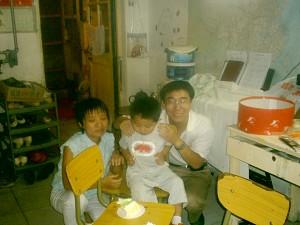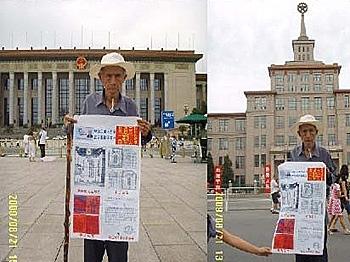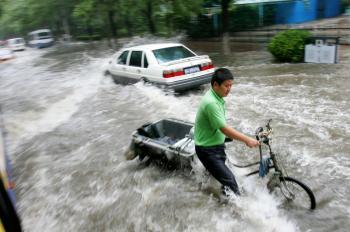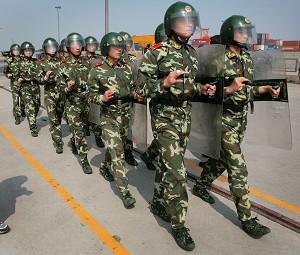When the Tiananmen Square massacre occurred on June 4, 1989, Xu Yonghai had graduated from college and was a doctor at the Department of Mental Health, Huilong Guan Hospital in Beijing. Xu Yonghai was 29 years old at that time.
Representing the Beijing Guanwashi Church under the leadership of Liu Fenggang, Xu Yonghai held the cross high as he and many other young church members walked the streets of Beijing. They went to Tiananmen Square several times to support the protesting students. On the night the massacre occurred in Beijing, Xu Yonghai said, “I trembled as I stitched up the wounds of the injured students and innocent civilians until dawn.”
‘Holding the Cross High, We Moved Toward Tiananmen Square’
Xu Yonghai said, “During the 1980’s the number of Chinese who practiced Christianity was still very small. The churches in Beijing had just been given permission by the government to open and hold weekly services. Only about 100 people came to the Sunday services at the Guanwashi Church. Most attendees were elderly. Attendance by younger people was still very low.”
“On May 12, 1989, led by Liu Huanwen, we walked the streets of Beijing joining those already marching in support of the university students’ anti-corruption movement. We marched in the name of our church. We held our cross high as we moved through the crowds toward Tiananmen Square. As Christians we wanted to fulfill our responsibilities to society.”
“Liu Huanwen at that time was the General Director of Security Group under ‘Capitol Workers Autonomous Assoication.’ On May 20, Beijing was announced to be under martial law. That night our church group had been the last to enter Tiananmen Square.”
Tanks Drove Into Tiananmen Square
“I arrived at Tiananmen Square at nine o'clock on the night of June 3. I witnessed the first tank driving into Tiananmen Square. At that time some people reported that the police and army had started to move and were coming toward Tiananmen Square from the west (the west of Changan Street). I walked toward the west. Between 10:30pm. and 11pm I arrived at the Xidan Road. Suddenly all the street lights went out. There was no light at all. Ten minutes later I heard gunfire.
The gunfire was from far away. I knew it was coming closer because the sound was getting louder and louder. Several vehicles parked on Xidan Road as roadblocks were torched. The vehicles gave off bright flames as they burned. People all ran toward the burning vehicles.”
On the Morning of June 4, Twenty-three People Died at the Beijing Post and Telecommunication Hospital
“After a while, I saw many people running over from the direction of Muxidi. Most were injured and drenched in blood. They were shocked and were panicking in response to the brutal attack by the army and police. Most people did not know how to react and were running around aimlessly.”
“I helped by carrying the injured to the Beijing Post and Telecommunication Hospital (the Youdian Hospital) which was close to Xidan. From midnight to 5am in the morning of June 4, I spent the most painful and unforgettable moments of my life.”
“At that time I saw endless injured people being sent to the hospital for emergency medical care. The injured were being carried on the backs or arms of friends, leaning on their shoulders, or being dragged to the hospital. Downstairs and upstairs, inside and outside of the hospital, injured people were everywhere. The two to three hundred beds at the hospital were quickly filled. The injured people cried out in pain. Their bodies were badly mutilated.”
Xu Yonghai’s voice choked with sobs as he recalled the miserable sight he saw that terrible night.
“One person had a big hole in his arm, the bone was broken with only a little bit of flesh attached. Another person was already dead, shot in the neck from behind.
“One sister and brother came into the hospital together. The brother died before he could receive medical attention. The sister cried so piteously, as she was in such anguish…”
“I was also in a lot of pain. By the time I left the hospital that next morning, twenty-three people had died. For me, that night is a very painful memory that I would like to forget. Blood was all over my body, all over my hands…”
Stitching Up the Wounded
“I would never have imagined that in China where the government boasts, ’the Chinese Communist Party (CCP) army is an army for the people‘ and ’the army are the people’s brothers and sons,’ that the army itself would open fire on the people of China. My heart trembled as I witnessed the truth about the immeasurable tragedy and violence occurring on Tiananmen Square.”
“I managed to find the doctors who were on duty at the Youdian Hospital and showed them my badge. Even though I was a psychiatrist at Huilongguan Hospital I had never performed a surgery after I graduated from school. I only had done it during practical training at Beijing Medical University. However, there were not enough doctors on duty so I volunteered. I was determined to help the wounded.”
“One after another, I stitched up the wounded. Later, I helped make arrangements for those recovering from surgery. Throughout the night the sound of gunshots never ceased. Tears kept rolling down my face.”
“At 5:00am, I suddenly remembered my mother. She hadn’t seen me the entire night and was bound to be worried. I hurried home. Mom was concerned about me and my sister and she hadn’t slept at all the entire night.”
“In the next few days everyone knew what had happened. Many hospitals in Beijing saved many lives but many lives were also lost. During those few days we saw helicopters flying back and forth continuously over Tiananmen Square.”
“A thorough police search was conducted after the massacre on June 4. Many people were thrown into prison.”
Sounds of Gunshots Dashed Faith in the CCP
Xu Yonghai said, “The people of China paid an extremely heavy price on June 4. It was then that we all began to realize the truth. What the CCP said all sounded too good to be true. They used all the nice words that had ever existed but what they did was the opposite in the extreme. They said things one way and then did the other. How could the people continue to believe in the CCP? It was during this time that the Chinese people gave up the faith they at one time had in the CCP. They saw that the CCP could not save China and could not change people’s hearts. People abandoned the CCP. Many people began attending churches and became believers in God.
“During the 1990’s there had been only a few million Christians all over China. In 2000, the number of Christians in China approached 100 million. This rapid increase in the number of Christians in China in such a short period of time could only be described as nothing less than a miracle.
“It was in February 1989 when I first visited the Gangwashi Church. The church only seated 300 people. Later, the church was expanded to seat 700 people. Most of the people attending the church were elderly.
“There was also a gathering at the church for younger people held on Thursday nights. At most there were 30 to 40 people attending these Thursday night gatherings.
“After the massacre, these numbers increased significantly. By 1994, one Sunday service was not enough to accommodate everyone. The number of services in 1994 was expanded from two to three to accommodate demand. In 2000 the number of Sunday services was increased to five. Later, the church expanded once again with each service now accommodating more than one thousand people.”
Resigning From the CCP and Its Youth Organizations
Xu said, “I am 46 years old. When we were young we all truly believed in the CCP. The CCP said communism would enable everyone to live good lives and live affluently together. But reality tells us that things are not like that today in China. It is only those few people who are living the good life, those special interest groups, who continue to recite this empty rhetoric of the CCP and to believe it to be true.
“Most people in China today do not live a good life; on the contrary, they are becoming poorer and poorer. The list of problems is endless including forced relocations, lack of adequate housing, farmers losing land, unemployment and lack of education. The wide gap between the rich and the poor is becoming even more polarized under the CCP.
“Have the ‘newly’ rich labored for their money? No. In the past, capitalists would have to go through several generations of hard work in order to become millionaires. In today’s corrupted Chinese society the millionaires and billionaires are made overnight. The special interest groups take for themselves what the people have labored for over many years. The special interest groups lead lives of debauchery and spend extravagantly without limits.
“We are all victims of believing in the CCP. It is a common phenomenon at present to see people oppressing each other. This is what we Christians cannot tolerate. We have always fought for human rights.
“When I was young I joined the CCP Young Pioneers Team. I truly believed what the CCP preached about serving the people. In middle school I began to have my own independent thoughts and opinions and made the decision not to become a member of the CCP Youth League. When I attended college in 1979, everyone in class was either a CCP member or a member of the CCP Youth League. I was the only one who was not affiliated with the CCP. In the end I had no choice but to become a member due to the pressure exerted upon me by both my classmates and the CCP administration at my school.
“I have read the ‘Nine Commentaries on the Communist Party.’ I have read the news about ten million people quitting the CCP on the Internet. Communism disappeared from the people’s hearts a long time ago. Today, I am a Christian with my own beliefs and pursuits.
“I hereby solemnly declare my resignation from the CCP Young Pioneers Team and the CCP Youth League.”




